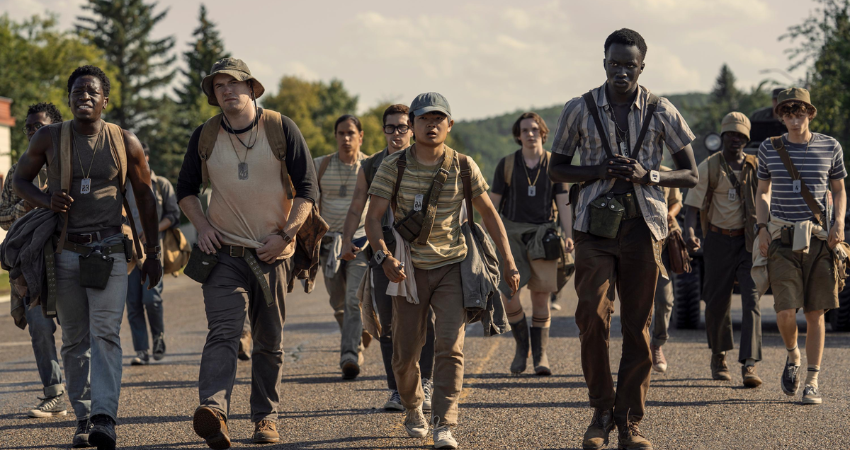Film review: The Long Walk
In 1979, when Richard Bachman’s novel The Long Walk first released, it was read largely as a book reflecting on the Vietnam War: a conflict where young people were drafted and sent to their death with little sense of reason or purpose. The promised glory for the lone survivor at the end of battle felt like a false promise from the beginning, because that’s how the world works.
Director Francis Lawrence’s new film adaptation has the same set-up as the original: a large group of young men from across America are drafted into an annual competition in which they’re made to walk for as long as they can, and while the last one left walking will receive a fabulous prize, all the others will be shot as they collapse or stop.
The story is the same, but the central metaphor has shifted. When we first meet antagonist The Major – played with aplomb by an excellent Mark Hammill, who performs the character with a clear sense of disrespect – he gives a pointed speech about what has gone wrong with America, citing an epidemic of laziness, and suggests that, through the horror of an event like The Long Walk, the country will be restored once again to greatness. Hammill stops just short of holding up the screenplay to show you the words “Make America Great Again” crossed out.
Richard Bachman was, of course, a pseudonym for Stephen King, and the few novels he wrote under this name tended to have an even meaner streak than his usual fare. King, whose personal politics have ebbed and flowed over the years, has settled into a mode in his later years that you’d charitably call “well-meaning”: the sort of man who sometimes seems to dislike Trump more for his vulgarity than his politics.
The Long Walk, which deviates substantially from the novel in places but still really feels like a Stephen King story, is a slightly more nuanced take on the material than the man himself might have provided us if he’d written the screenplay. It succeeds, largely, by focusing on the suffering of these poor kids more than the society that has put them in this position. Screenwriter JT Mollner recognises that the heart of the story is the friendship between two of the walkers, Raymond Garraty (Cooper Hoffman) and Peter McVries (David Jonsson), and focuses in on their conversations as the film’s primary focus.
If The Long Walk has a message, it’s a simple one: if and when the world collapses, it’s our connections with others that will sustain us. When the end comes for the kids in The Long Walk, they rarely go peacefully – but the ones who are able to have some grace at the end are the ones who have formed connections, or found something in themselves worth fighting for.
For a movie about a bunch of young adults going for a walk, The Long Walk is extremely tense, and every single death is felt. The cast is strong – Cooper Hoffman, son of the late Phillip Seymour Hoffman, is well-cast as a young man who carries an obvious chip on his shoulder over the loss of his own father, and Judy Greer, who plays his mother in a handful of scenes, never misses. But the real revelation is David Jonsson: his McVries is cool and charming, sardonic and mannered, but with a pain that sometimes bubbles to the surface. There are no bad performances in The Long Walk, but seeing Jonsson is like watching a star being born on-screen.

The Long Walk is meandering and unsubtle in places – it’s a Stephen King adaptation after all, and I mean that with love. But it wasn’t until I walked home after the movie that I realised how much it had gotten under my skin. My trip from the cinema to the front door represented maybe one five-hundredth of the distance covered in the film, but it was enough for me to think about what it would take for me to keep going, forever and ever – who and what would keep me going. The Long Walk comes back, again and again, to the idea of imbuing small moments with importance. For all its horrors, there’s a hopefulness at The Long Walk‘s core – a sense that, as bad as things can get, the keys to our salvation rest within each of us.
James O’Connor has been writing about pop culture and games since 2008. He is the author of Untitled Goose Game for Boss Fight Books.






1 thought on “A Grisly Stephen King Film Adaptation Finds Hope Amid The Horror”
A lovely insight into a meaningful film, thank you.